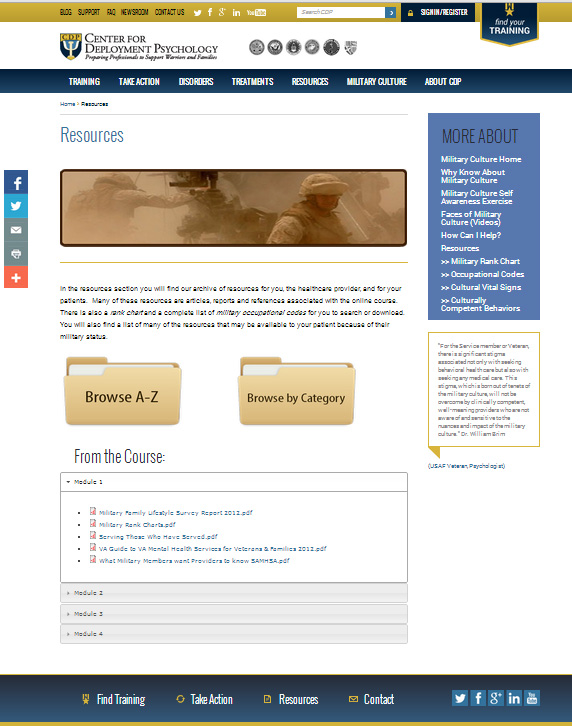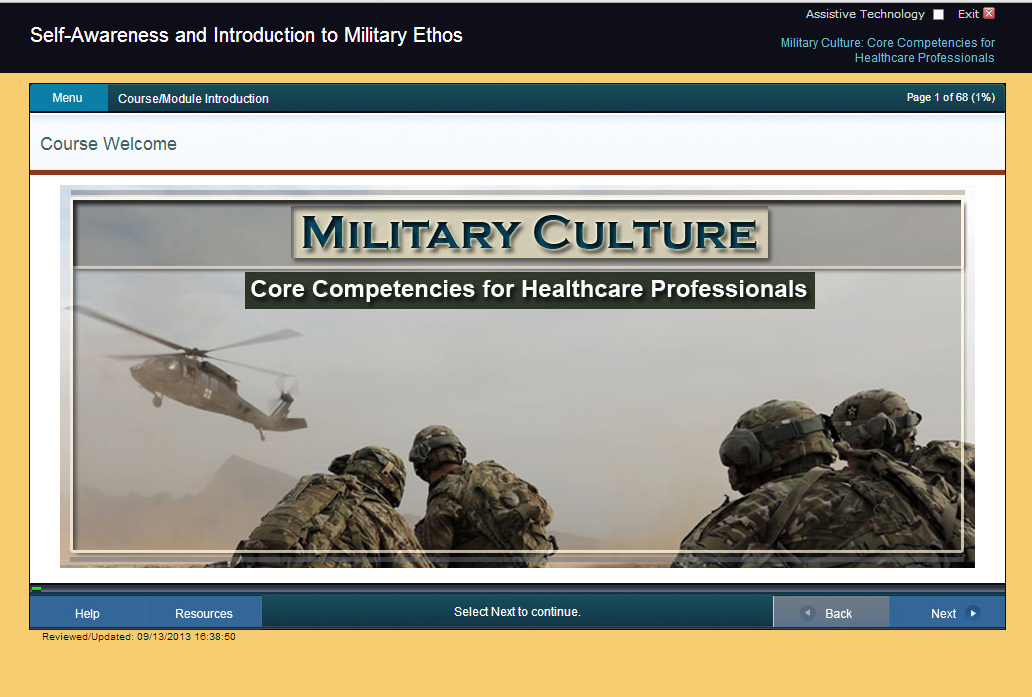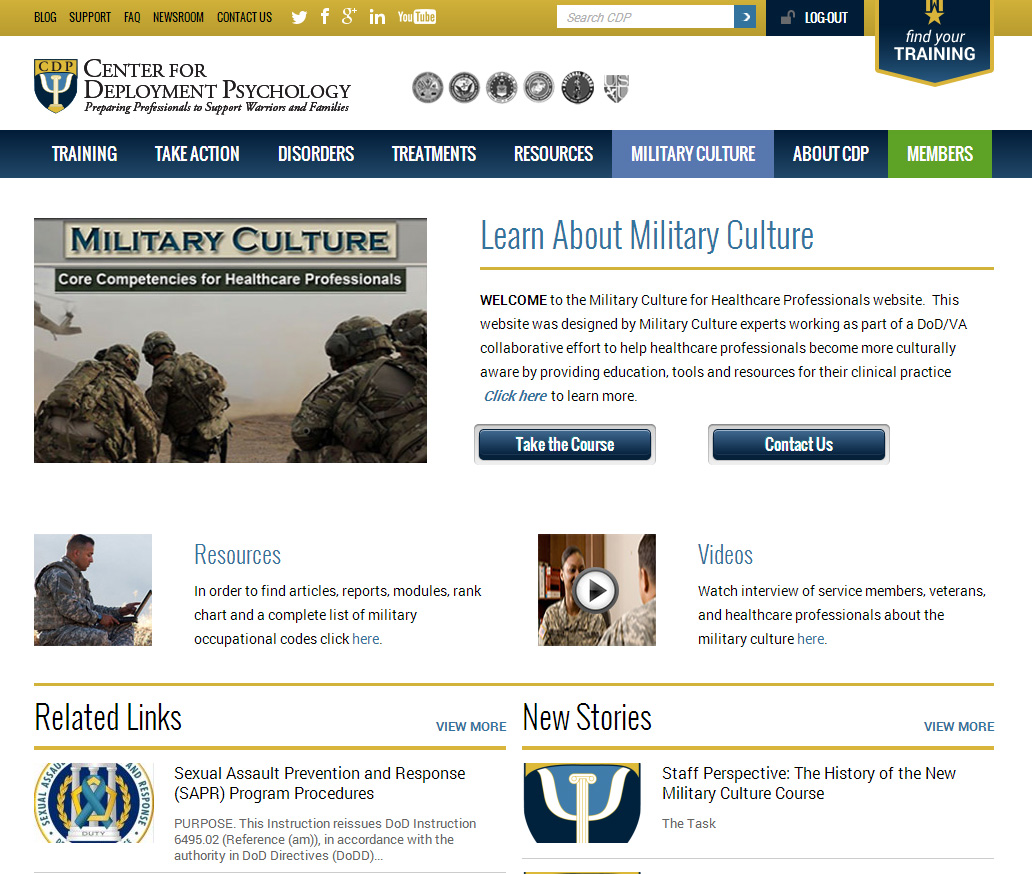Staff Perspective: The History of the New Military Culture Course
The Task
In October 2009, the Departments of Defense (DoD) and Veterans Affairs (VA) conducted a joint Mental Health Summit that brought together behavioral health experts and leaders from both departments with the goal of developing a strategy that would facilitate coordination for the delivery of mental health services. From that meeting 28 strategic actions were recommended for implementation. In June of 2010, I unwittingly attended a DoD/VA Coordination Kick-Off Meeting (which was just as fun as it sounds) that resulted in the Center for Deployment Psychology, and specifically me, being named the DoD Lead on Strategic Action #25 – Military Culture Training for Healthcare Providers. This tasking made sense for CDP, as we had already spent the last several years training military and civilian healthcare providers about military culture and how that culture affects healthcare. However, the work was only just beginning…
Shortly after the June meeting, I had the pleasure of meeting Dr. Patricia Watson, who had (equally unwittingly she assures me) been designated the VA Lead for Strategic Action #25. Dr. Watson is a senior educational specialist for the National Center for PTSD (NCPTSD) and an assistant professor at Dartmouth. She is a former Navy psychologist and co-authored the Psychological First Aid Field Guide for the NCPTSD and the Combat Operational Stress First Aid Field Guide for the DoD. Together, we developed an implementation plan that would consume most of our waking hours for the next three years, culminating last week in the launch of the first of four e-learning modules on Military Culture.
The Team
Dr. Watson is an amazing and tireless colleague and we were honored to put together a spectacular working group of colleagues and experts in military culture from across the DoD, VA, and civilian sector. In March 2011, we held our first working group, which included Dr. William Nash (of Figley and Nash Combat Stress Injury and Combat and Operational Stress Management fame), Dr. Richard Westphal (co-author with William and Patricia on the COSFA manual), Drs Jenna Ermold and Anthony McCormick from CDP, and Drs. Wendy Tenhula, Harold Kudler and Vincent Roca from the VA, along with officer and enlisted representatives from each of the Services and Veterans from the Virginia Wounded Warrior Program. The team developed a comprehensive definition of military culture and the warrior ethos and sketched out a curriculum in military culture that went far beyond anything available in courses, books, or online.
Over the intervening two and a half years, the working group has expanded and contracted and consulted with additional experts (a list of more of the collaborators and working group team members is available at the end of this document). The CDP’s live and online e-courses in military culture were updated with information from the curriculum. We brought Dr. Jenna Ermold from the CDP in to the curriculum writing team with Bill Nash, Rich Wesphal, Patricia Watson and I, after which the content really took off. We made a decision to enhance the e-course with video clips from Service members, Veterans, family members, and civilian and military healthcare providers. We filmed over 100 hours of video interviews that are insightful, informative, and touching in ways we never imagined. The interviews were wide-ranging and targeted to answer questions relevant to the course content, so we covered military culture in general, but also, specifically discussed the impact of the deployment cycle, stigma in seeking healthcare, examples of interactions both good and bad with healthcare providers, and resources for Service members, Veterans and family members. Additionally, in collaboration with the VA’s Employee Education Services (EES), we hired actors and filmed several clinical vignettes to enhance the course. Finally, we developed a self-assessment tool, finalized the curriculum and contracted with an e-course development company to put together the final product.
The final e-learning curriculum is easily the most comprehensive discussion of military culture, the warrior ethos, the impact of deployment, and the resources available to Service members and Veterans currently offered. The target audience for the course is both military and civilian healthcare providers, specifically behavioral healthcare providers. The full course, Military Culture: Core Competencies for Healthcare Professionals is comprised of four modules. The first module introduces the warrior ethos concept and gives the learner the opportunity to reflect on their own beliefs and potential biases related to the military culture that might impact on the provision of healthcare to Service members and Veterans. Module 2 looks at the military organization and the roles of each Service. Module 3 delves into the impact of stressors, including deployment, on the Service member and their families. Finally, Module 4 brings together a discussion of treatment resources and tools available to the Service member, Veteran, family member, and to the healthcare provider.
The first module launched on 8 November 2013 and is available for two (2) continuing education credits for most disciplines of healthcare providers. Modules two through four will be available by 8 February 2014. The course is available for free for all learners. VA employees can find the course on the VA Talent Management System (TMS). DoD and civilian providers can find the course on the Military Health System’s (MHS) Federal Health Care Consortium courses website.
The Strategic Action #25 implementation plan included the launching of a military culture website as a companion to the e-learning course. The website is hosted by the Center for Deployment Psychology at www.DeploymentPsych.org/Military-Culture. On this site you will have easy access to all of the material from the e-learning course, including the reference list and all publically available resources, a printable rank chart, and a handy interactive listing of all the various military occupational codes. Additionally, all of the videos and clinical vignettes from the course are on the website, as well as additional video footage from our interviews. The self-assessment tool from the course can also be taken online and the healthcare provider can also learn more about working with Service members and Veterans and their families through links to TRICARE provider network information, volunteer opportunities, and additional continuing education opportunities.
The End?
Military culture, like all cultures is evolving and assimilating and the experience of the culture is heterogeneous. The learning never ends and neither will our efforts to provide high-quality education and training to healthcare providers. Let us hear from you. We want to know what you think and what resources you’d like to see on the site. You can post your respectful and constructive thoughts about the course or military culture in the comments section below. Thank you for serving and thank you for working with our Service members, Veterans and their families.
Dr. Bill Brim is the Deputy Director of the Center for Deployment Psychology. The focus of Dr. Brim’s clinical work, supervision, and training is on deployment- and redeployment-related mental health issues, specifically assessment and treatment of Post-Traumatic Stress Disorder and insomnia.
The Team
Working group members (in no particular order)
Dr. Patricia Watson, VA Lead, Dr. William Brim, DoD Lead, Dr. Jenna Ermold, Dr. Sushma Roberts, Dr. William Nash, Dr. Richard Wesphal, Dr. Harold Kudler, Dr. Wendy Tenhula, Dr. Vincent Roca, Dr. Anthony McCormick, Dr. Mark Bates, Mr. Richard Hart, Mr Dave Galloway, Mr. Mike Fisher, MSgt Laurie Wienclawski, LTC Phillip Holcombe, Mr. Carlton Drew, Ms. Kacie Kelly, Ms. Rabia Mir, Mr. Greg Henrichsen, Dr. Courtnee Pelton, Mr. Scott Swaim, Dr. Chris Crowe, Mr. David Brown, Ms Mary Schuble, Mr. Greg Leskin, Ms. Karen Malebranche, Dr. Ken Furman, Mr. Kyle Hausmann-Stokes, Dr. Josef Ruzek, MAJ Todd Yosick, Dr. Bruce Capehart, Ms. Kristin Stephenson, Mr. Jason Goldwasser
The VA and EES Team
Mr. John Hayes, Ms Julia Cashel, Mr. Ron Farson, Dr. David Twitchell, Mr Casey Grysen
The CDP Website Team
Ms. Tayebeh Monfared, Mr. Chris Adams, Mr. Micah Norgard
The Allen Corporation Team
Ms. Patricia Felding, Ms. Fern Wharton, Ms. Suzanne Campbell, Mr. Brian Carpinelli, Mr. John Hyman
The Task
In October 2009, the Departments of Defense (DoD) and Veterans Affairs (VA) conducted a joint Mental Health Summit that brought together behavioral health experts and leaders from both departments with the goal of developing a strategy that would facilitate coordination for the delivery of mental health services. From that meeting 28 strategic actions were recommended for implementation. In June of 2010, I unwittingly attended a DoD/VA Coordination Kick-Off Meeting (which was just as fun as it sounds) that resulted in the Center for Deployment Psychology, and specifically me, being named the DoD Lead on Strategic Action #25 – Military Culture Training for Healthcare Providers. This tasking made sense for CDP, as we had already spent the last several years training military and civilian healthcare providers about military culture and how that culture affects healthcare. However, the work was only just beginning…
Shortly after the June meeting, I had the pleasure of meeting Dr. Patricia Watson, who had (equally unwittingly she assures me) been designated the VA Lead for Strategic Action #25. Dr. Watson is a senior educational specialist for the National Center for PTSD (NCPTSD) and an assistant professor at Dartmouth. She is a former Navy psychologist and co-authored the Psychological First Aid Field Guide for the NCPTSD and the Combat Operational Stress First Aid Field Guide for the DoD. Together, we developed an implementation plan that would consume most of our waking hours for the next three years, culminating last week in the launch of the first of four e-learning modules on Military Culture.
The Team
Dr. Watson is an amazing and tireless colleague and we were honored to put together a spectacular working group of colleagues and experts in military culture from across the DoD, VA, and civilian sector. In March 2011, we held our first working group, which included Dr. William Nash (of Figley and Nash Combat Stress Injury and Combat and Operational Stress Management fame), Dr. Richard Westphal (co-author with William and Patricia on the COSFA manual), Drs Jenna Ermold and Anthony McCormick from CDP, and Drs. Wendy Tenhula, Harold Kudler and Vincent Roca from the VA, along with officer and enlisted representatives from each of the Services and Veterans from the Virginia Wounded Warrior Program. The team developed a comprehensive definition of military culture and the warrior ethos and sketched out a curriculum in military culture that went far beyond anything available in courses, books, or online.
Over the intervening two and a half years, the working group has expanded and contracted and consulted with additional experts (a list of more of the collaborators and working group team members is available at the end of this document). The CDP’s live and online e-courses in military culture were updated with information from the curriculum. We brought Dr. Jenna Ermold from the CDP in to the curriculum writing team with Bill Nash, Rich Wesphal, Patricia Watson and I, after which the content really took off. We made a decision to enhance the e-course with video clips from Service members, Veterans, family members, and civilian and military healthcare providers. We filmed over 100 hours of video interviews that are insightful, informative, and touching in ways we never imagined. The interviews were wide-ranging and targeted to answer questions relevant to the course content, so we covered military culture in general, but also, specifically discussed the impact of the deployment cycle, stigma in seeking healthcare, examples of interactions both good and bad with healthcare providers, and resources for Service members, Veterans and family members. Additionally, in collaboration with the VA’s Employee Education Services (EES), we hired actors and filmed several clinical vignettes to enhance the course. Finally, we developed a self-assessment tool, finalized the curriculum and contracted with an e-course development company to put together the final product.
The final e-learning curriculum is easily the most comprehensive discussion of military culture, the warrior ethos, the impact of deployment, and the resources available to Service members and Veterans currently offered. The target audience for the course is both military and civilian healthcare providers, specifically behavioral healthcare providers. The full course, Military Culture: Core Competencies for Healthcare Professionals is comprised of four modules. The first module introduces the warrior ethos concept and gives the learner the opportunity to reflect on their own beliefs and potential biases related to the military culture that might impact on the provision of healthcare to Service members and Veterans. Module 2 looks at the military organization and the roles of each Service. Module 3 delves into the impact of stressors, including deployment, on the Service member and their families. Finally, Module 4 brings together a discussion of treatment resources and tools available to the Service member, Veteran, family member, and to the healthcare provider.
The first module launched on 8 November 2013 and is available for two (2) continuing education credits for most disciplines of healthcare providers. Modules two through four will be available by 8 February 2014. The course is available for free for all learners. VA employees can find the course on the VA Talent Management System (TMS). DoD and civilian providers can find the course on the Military Health System’s (MHS) Federal Health Care Consortium courses website.
The Strategic Action #25 implementation plan included the launching of a military culture website as a companion to the e-learning course. The website is hosted by the Center for Deployment Psychology at www.DeploymentPsych.org/Military-Culture. On this site you will have easy access to all of the material from the e-learning course, including the reference list and all publically available resources, a printable rank chart, and a handy interactive listing of all the various military occupational codes. Additionally, all of the videos and clinical vignettes from the course are on the website, as well as additional video footage from our interviews. The self-assessment tool from the course can also be taken online and the healthcare provider can also learn more about working with Service members and Veterans and their families through links to TRICARE provider network information, volunteer opportunities, and additional continuing education opportunities.
The End?
Military culture, like all cultures is evolving and assimilating and the experience of the culture is heterogeneous. The learning never ends and neither will our efforts to provide high-quality education and training to healthcare providers. Let us hear from you. We want to know what you think and what resources you’d like to see on the site. You can post your respectful and constructive thoughts about the course or military culture in the comments section below. Thank you for serving and thank you for working with our Service members, Veterans and their families.
Dr. Bill Brim is the Deputy Director of the Center for Deployment Psychology. The focus of Dr. Brim’s clinical work, supervision, and training is on deployment- and redeployment-related mental health issues, specifically assessment and treatment of Post-Traumatic Stress Disorder and insomnia.
The Team
Working group members (in no particular order)
Dr. Patricia Watson, VA Lead, Dr. William Brim, DoD Lead, Dr. Jenna Ermold, Dr. Sushma Roberts, Dr. William Nash, Dr. Richard Wesphal, Dr. Harold Kudler, Dr. Wendy Tenhula, Dr. Vincent Roca, Dr. Anthony McCormick, Dr. Mark Bates, Mr. Richard Hart, Mr Dave Galloway, Mr. Mike Fisher, MSgt Laurie Wienclawski, LTC Phillip Holcombe, Mr. Carlton Drew, Ms. Kacie Kelly, Ms. Rabia Mir, Mr. Greg Henrichsen, Dr. Courtnee Pelton, Mr. Scott Swaim, Dr. Chris Crowe, Mr. David Brown, Ms Mary Schuble, Mr. Greg Leskin, Ms. Karen Malebranche, Dr. Ken Furman, Mr. Kyle Hausmann-Stokes, Dr. Josef Ruzek, MAJ Todd Yosick, Dr. Bruce Capehart, Ms. Kristin Stephenson, Mr. Jason Goldwasser
The VA and EES Team
Mr. John Hayes, Ms Julia Cashel, Mr. Ron Farson, Dr. David Twitchell, Mr Casey Grysen
The CDP Website Team
Ms. Tayebeh Monfared, Mr. Chris Adams, Mr. Micah Norgard
The Allen Corporation Team
Ms. Patricia Felding, Ms. Fern Wharton, Ms. Suzanne Campbell, Mr. Brian Carpinelli, Mr. John Hyman



 The Course
The Course The Website
The Website